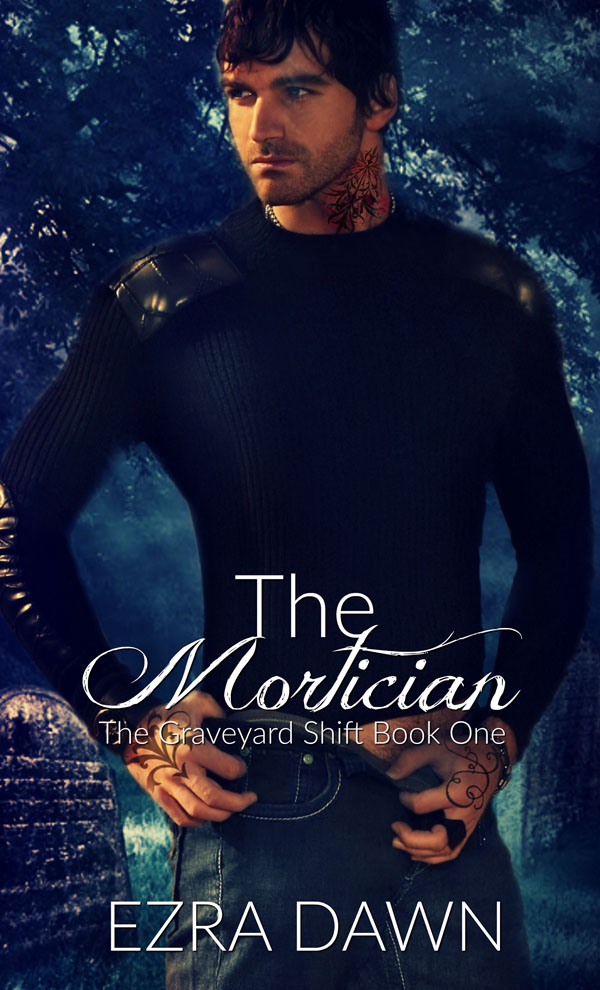by
For killing his husband, Rook is sent to B-226—an alien planet populated by deadly creatures, where the average life expectancy for a prisoner is three weeks. Rook is relieved by the sentence—all he wants is to die and rejoin his husband.
Upon arrival on B-226, Rook is partnered with Stevie, who has beaten the odds and survived for several months. Rook is drawn to Stevie in a way he didn't expect in the aftermath of losing his husband. Before Rook can untangle the mess of his emotions, the already deadly situation on B-226 worsens, plunging Rook and Stevie into an even more desperate struggle to survive.
- 2 To Be Read lists
- 1 Currently Reading list
Cover Artists:
Genres:
Pairings: F-F, M-M
Heat Level: 3
Romantic Content: 3
Ending: Click here to reveal
Character Identities: Gay
Protagonist 1 Age: 36-45
Protagonist 2 Age: 26-35
Tropes: Big Character / Little Character, Class Differences, Coming Home, Criminals & Outlaws, Everyone is Queer, Hurt / Comfort, Love Can Heal / Redemption, Second Chances, Sex Buddies Become Lovers, Trapped Together
Word Count: 73000
Setting: B-226
Languages Available: English
Rook woke to sunlight and a cool breeze on his face. He was on the beach with Carlo.
Everything was perfect.
“Wake up, sleepyhead.” There was a smile in Carlo’s voice, “We’re here.”
Here? They were already at the beach; where else would he want to go?
Slowly, Rook opened his eyes. Carlo’s voice and the soft touch of his hands on Rook’s face vanished.
He wasn’t surprised that the light had woken him. They had kept the panels covering the portals closed during the flight. Apparently the sight of all those stars with nothing in between was too much for the human mind to handle, especially the already volatile mind of a prisoner who’d essentially been sentenced to death. Rook had heard they’d been cleaning up bits of the last incident for weeks. For incident, read ‘one of the prisoners went crazy, managed to kill someone, and then hung himself.’
READ MORERook wondered if the family of the convict who’d gone mad during that cautionary tale of a flight—before they had begun closing the viewports to block out the sight of empty space—had been sent a bill for property damage.
What little light the prisoners had been given, a few hours each day, just enough to keep them alive and more or less well without wasting precious power on them, had been glaring, bright, artificial. This light was different. Around him, the other prisoners were stirring as well, brought up from their restless, dark dreams—what they’d left behind, what awaited them—by this soft, almost gentle light.
They weren’t shackled on the voyage. Where could they go? The crew was safe behind steel bulkheads. An automated, time-released flap on one of the otherwise featureless grey walls delivered all of the prisoners’ food and water. In Rook’s opinion, if the prisoners wanted to kill each other, it might just be for the best, given what awaited them at their journey’s end.
They were monitored by a camera, though, and if fighting got too intense, the oxygen level in the prisoners’ hold lowered until they passed out.
Rook blinked. Even though the light meant they had arrived, that his sentence had officially begun—‘travel time doesn’t count,’ he had been gleefully informed as they were herded onto the ship for the four-month journey—Rook couldn’t help feeling relieved to see sunlight again, especially after spending the whole trip with artificial light. He smiled ruefully. Did his sentence start now, or did he have to wait until his clunky, uncomfortable uniform boots hit the foreign soil outside? Either way, there was an unimaginable difference between three weeks—his expected survival time—and twenty-three years—his actual sentence. The next shipload of prisoners was probably already on its way.
They staggered them three weeks apart.
It would have been massively unfeasible to run an operation like this, when the time spent transporting fresh bodies was longer than the time they were expected to live, if it weren’t for two things. First, those bodies were prisoners, and therefore didn’t need to be paid.
Second, of course, was betwixium. Named for the planet of its origin—B-226—and its perplexing nature, betwixium made all of those long-distance, interstellar flights possible. The mineral had many properties, but its primary function was as a fuel of remarkable efficiency. Three grams had been enough to hurtle their ship through space for the entire flight.
It was, of course, wonderfully rare, and thus expensive.
Prisoners were needed to obtain the mineral, but the mineral was needed to transport prisoners.
Rook closed his eyes again, trying to recapture the sound and feel of Carlo, but he was gone. Good. He didn’t want even the memory of his husband following him to this awful place where even the sunlight he had been enjoying was subtly wrong.
Still, the breeze on his face felt good. It also made him aware that there were tears on his cheeks. He brushed them away with his sleeve. He couldn’t afford to show weakness here. Not when he was so close to the relative freedom of the planet’s surface.
The flight had essentially been long periods of waiting and near-silence between the sudden ker-chunkof the flap that signaled their next meal was about to arrive—the sound making them salivate like Pavlov’s long-dead dogs.
Rook supposed the flap opened on a regular schedule, but there was no clock in the prisoners’ area, no way of telling time beyond the on-off-on of the overhead lights, telling them when to sleep and when to wake.
There were tablets provided, one for each prisoner, heavy, awkward, damage resistant models that were almost a decade out of date, which could show books or films or games. They didn’t show any pornography, and even the most skilled hackers in the group couldn’t change that fact, but there was nothing else to do. Rook had read for most of the flight, trying to block out his companions.
There had been fights, of course, but after so long trapped with the same group of people, even fighting had eventually become tiresome once they worked out a hierarchy and everyone knew his place.
Rook had fought once, and only once. He had broken his opponent’s wrist and then gone back to reading Victor Hugo in the original French.
Rook was big and intimidating, towering over most of the other prisoners, menacing even when doing nothing. They left him alone after that, and he was grateful.
Let them think that he was playing violent games instead of reading poetry.
Rook had a plan. He was going to live as long as he could, because he knew that Carlo would have wanted him to, and then he was going to die and be reunited with his husband. This planet was kind enough to ensure that ‘as long as he could’ wouldn’t be very long at all.
So he kept to himself, and read, and drooled when he heard the flap opening like the rest of the dogs. He also daydreamed, and touched himself in the night when the lights were out. He thought, always, of Carlo.
It wasn’t the first time that he had woken with tears on his face. He had learned to wipe them beneath his arms, where the moisture could be explained away as sweat.
“This is your captain speaking,” came a disembodied, tinny voice from the shitty speaker. The voice didn’t bother disguising its sneering humor; its body was safe behind the curved steel walls, and even the speaker was protected from any wrath or boredom the prisoners might otherwise inflict on it. “We have landed on B-226, and we will begin disembarking shortly. Your patience is appreciated.”
As though they had any choice. Rook rolled his eyes and settled down to wait. His bed was already folding up into its daytime seat again. The breeze was fresh air pumped from outside, not just the stale, recirculated stuff they had been breathing for the past four months since leaving Earth.
Rook was surprised that the crew had bothered to tell them anything. This was certainly the first they had heard from the ‘captain.’ It was probably done more for the crew’s entertainment than for the prisoners’ enlightenment.
There was a rush for the door when it finally opened, a mad scramble as the grey-clad prisoners whooped and hollered and tried to be the first outside. All of their hard-earned dominance was forgotten as, like animals kept inside for the winter, they pushed and fought to escape their confines, rejoicing in the fresh air, the kiss of sunlight.
Rook was in no hurry. He waited until the furor had died down before making his way down the ramp and into the off-colored sunlight of B-226. His new—and highly temporary—home.
The prisoners were all herded together into a loose clump in the middle of the large clearing that served as a landing pad for ships. The doors of the ship Rook had just left closed behind him, reminding the prisoners that this was, essentially, a one-way trip. No one had ever served out their complete sentence.
“Welcome to B-226. I am Miranda.” A stern-looking woman dressed in, basically, a well-fitting, higher quality version of the prisoners’ grey uniform stood at the head of their group, flanked by more guards. Her feet, in highly polished black boots that dared the dust the ship’s landing had stirred up to settle on them, were planted the exact width of her shoulders apart. Her hands were crossed behind her back, one hand holding the opposite wrist. She had clearly been part of the military at some time.
Rook wondered what sort of colossal screw-up had gotten her banished here; surely no one would choose this duty. He hadn’t thought much about the kind of person who would take the job of dumping prisoners on a planet to die, but if he had, she would have fit the image perfectly—cold, detached, rigid.
“You may call me Miranda, and I will call you by your names, if you live long enough for me to learn them. I don’t believe in telling you unnecessary lies—you have been sent here to die. Because of this reality, we insist on very little formality.”
There were assorted noises from the assembled prisoners. One of them actually fainted. What had he expected? That the rumors were all fabricated, that they were actually being sent to some cushy prison and no one ever returned because they never wanted to leave?
For his part, Rook was relieved. He had come here to die, and he appreciated Miranda’s straightforward acceptance of that fact.
“You won’t find many of the same rules here as you would in an ordinary prison. You can fuck. You can fight. You can kill each other, if you feel it necessary to speed up the inevitable. You will do your assigned duties, or you will not be fed. Feel free to try and find something edible in this jungle.” She gestured briefly to the unbroken expanse of extremely alien wilderness, before her hand snapped back into its position behind her back. “You will, of course, leave the miners alone.”
She continued speaking, but Rook found his attention drifting. The sky here wasn’t blue, not the same way it was on Earth. It had more than a tinge of green, making it look like they were beneath the surface of some warm, tropical sea, looking up through the water, with the real sky somewhere beyond. It made him think of his last trip to the beach with Carlo, before…
Rook stopped that thought before it could fully form, nails biting into the palms of his hands as though he could physically squeeze the memory out and away from himself.
He looked at the ruins, instead. B-226 had originally housed a paradise for the fantastically wealthy and their servants, before the discovery of betwixium had made the planet so valuable, a place of interest to more than the jaded elite.
The lofty white buildings cut into the living stone of a vast cliff and topped with golden roofs, were startlingly bare of plant life. They must still have their coating of poison keeping them from being swallowed back into the rapidly growing jungle. The trees surrounding the clearing they’d landed in were all scorched, and there was a thick, white ring marking the edges that Rook suspected was more than aesthetic.
There was even a flag still flying above one of the towers.
No, not a flag. It moved, away from the building. A kite? This place couldn’t be so terrible, if people still found the time and volition to do something as frivolous as kite flying.
Rook had never seen a pure-black kite before.
It swooped, falling toward the assembled people below.
Miranda, who had appeared to be engrossed in her speech, gave a sharp nod to one of her guards. She, like most of the guards and other prisoners, was white.
In a smooth motion that spoke of much practice, the guard lifted her weapon, aimed, and shot.
The kite jerked in midair. It continued falling toward the clearing, but it was no longer moving on its own.
There was a hideous crunch as the thing landed, and an even worse smell. The prisoners groaned and stepped out of their cluster, instinctively wanting to get away from the creature.
For creature it was. Rook looked at it, curious.
The guard who had shot it prodded the black thing with her weapon. She nodded, and another guard stepped forward.
This one wore a complicated harness and had a large metal cylinder or tank strapped to his back. He adjusted a few nozzles on the weapon he held, and a jet of flame leapt from it. He prepared to turn it on the fallen creature.
“Wait.”
Rook looked up. It was Miranda who had spoken, and she was watching him.
She beckoned to Rook. “Come and take a look, if you’d like. You’ll be seeing a lot more of them.”
Rook stepped closer, ignoring the stench. The thing looked like nothing so much as an umbrella, crumpled from where it had slammed into the dirt. It was covered in very short, velvety black fur. It had lots of loose skin, supported by thin bones, or perhaps spines.
The guard who had shot it gave it another prod, rolling it over.
On its inside surface, where the handle of the umbrella would have met the fabric, it had three perfectly round mouths, each surrounded by a ring of razor-sharp, needle-shaped teeth. It was horrifying, like a lamprey in triplicate. One of the mouths moved reflexively and Rook jumped.
“What is that thing?” he asked, horrified but curious.
The guard holding the flamethrower shrugged. “We call ’em bats. You’ve gotta burn ’em quick, or the smell attracts more.” He clicked his flamethrower on again and turned the gush of flame on the ruined umbrella.
Soon there was nothing left but a few blackened scraps, and the creature’s reek had been replaced by the sickening smell of burned, rancid meat.
“Even that won’t work for much longer,” added the guard who had shot it. “They’re learning what the burned smell means. They know we’re killing them.” She pulled a pair of binoculars from her belt and handed them to Rook. “They fly around open, like an umbrella or a jellyfish, with their mouths underneath. They snap open and closed to propel themselves.” She pointed to distant black specks, high in the cloudless sky. “When they dive, they shut themselves and turn upside down, so their tips point toward the ground. That’s where their eyes are. Those mouths are like a meat grinder—human bone’s nothing for them.”
Rook took the binoculars and trained them on the distant bats. He didn’t look for long. Even this far away, they were horrible, and so alien they made his skin crawl.
Miranda clapped her hands once, sharply, to get the prisoners’ attention again. “You will each be paired off with a more experienced prisoner who will take you to the mine you’re assigned to guard. They will teach you everything you need to know about life on B-226—what little there is of it. There, you will also be given your weapons.”
The prisoners murmured and shuffled excitedly at the thought of weapons.
“Believe me, there is no point in using them against the miners. Hostages will get you nowhere. The next ship isn’t due for another three weeks, and you will die long before then without food. And you will not get food if you don’t cooperate.”
She motioned the prisoners forward one at a time, matching each with a member of her party. At least some of the people Rook had thought were guards—because of their weapons—were actually prisoners.
Rook was paired with a small, sly-looking man who gave him a drawn-out look of assessment. He had a long gun strapped to his back like one of the guards.
“You’re big. Good. You can carry a flame cylinder.” He jerked his head in the direction of the man who had burned the bat. “We’re always short of those; the cylinders slow them down and they tend to die off more quickly.”
Rook supposed that would have frightened most men, but an excuse to leave this miserable hell-hole and be reunited with Carlo sooner was exactly what he wanted.
“I’m Stevie.” The man held out a hand.
“Rook.”
“Don’t talk much, huh? I like that. The last guy I was paired with wouldn’t shut up.”
“What happened to him?” Rook asked, because it felt almost expected, though he wasn’t honestly sure he wanted to know.
“Bats got him. One before that couldn’t take it. Ran into the jungle. Never saw him again.”
“How long have you been here?”
“Me? Oh, I’m an old hand. Been here almost two months.”
Rook didn’t want to know how many partners this man had gone through in that time—two months was almost three three-week rotations—or exactly how long it took to be called an ‘experienced prisoner’ on this planet, where the life expectancy was so short.
“Well, may as well get it over with. What’re you here for?”
“I killed my husband.” Rook tried to ignore Carlo’s disapproving memory. It was the strict truth; any elaboration was between him and Carlo. The courts hadn’t cared, why should Stevie?
“Huh. I’ll keep that in mind. I’m here for thieving.”
“I didn’t think stealing got you sent to B-226.”
Stevie shrugged and grinned. “It does when you steal the president’s husband.”
Rook hadn’t heard about that. Then again, he had been cut off completely from any news for the last four months, since the prisoner transport had left Earth. Not that he’d been paying attention while waiting for his sentencing, or since, well…since Carlo.
“It’s a good thing you got here on a sunny day.” Stevie glanced up at the sky. “The dragons almost always come when it’s raining.”
COLLAPSE






